Public goods, as the name suggests, are for the facility and welfare of the public in general for free of cost. Whereas, private products are the ones which are sold by private companies to earn profits and fulfil the needs of the buyers. This is a significant difference between these two types of goods.
However, both public goods and private goods are for the consumer’s benefit; they differ drastically from each other. But, where public goods benefit the mass population, private products are only for those who have affordability. To know these differences in detail, read below.
Content: Difference Between Public Goods and Private Goods
- Difference and Comparison
- Types of Goods
- What are Public Goods?
- What are Private Goods?
- Advantages
- Disadvantages
- Summary
Difference and Comparison
| Basis | Public Goods | Private Goods |
|---|---|---|
| Meaning | Public goods are the ones which are provided by the nature or the government for free use by the public. | Private goods are the ones which are manufactured and sold by the private companies to satisfy the consumer needs and wants. |
| Provider | Nature or government | Manufacturers i.e. entrepreneurs |
| Consumer equality | Rich and poor are treated equally | Preference to rich consumers |
| Availability | Readily available to all | Reduces with each consumption |
| Quality | Remains constant | Varies with ability to buy |
| Decision | Social choice | Consumer's decision |
| Objective | Overall growth and development | Profit earning |
| Traded in Free Market | No | Yes |
| Opportunity Cost | No | Yes |
| Free riders problem | Yes | No |
| Rivalry | Non-rival | Rival |
| Excludability | Non-excludable | Excludable |
| Demand Curve | Horizontal | Vertical |
| Examples | Police service, fire brigade, national defense, public transport, roads, dams and river | Clothes, cosmetics, footwear, cars, electronic products and food |
Types of Goods
Before we read about the different kinds of goods available, we must clearly understand the meaning of the following two determinants of these types:
- Rivalry: Rivalry can be perceived as competition in consumption i./e. If one person consumes a particular good, the other has to let go of the opportunity of using it simultaneously.
- Excludability: The term excludability refers to the restriction on the usage of a product limited to the people who have paid for it.
Now, by the above two attributes, the goods are categorized into the following four types: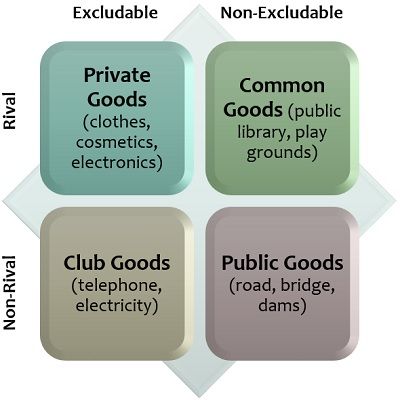
- Private Goods: The products which are rival and excludable at the same time as clothes, cosmetics and electronics are termed as private goods.
- Common Goods: These goods are though rival but are non-excludable, including a public library and playgrounds which can be used by anyone. Also, usage by one person or team restricts its usage by the other person or group.
- Club Goods: Such goods are though excludable but are not rival like the telephone and electricity which are both chargeable, but many people can relish these services simultaneously.
- Public Goods: The goods which are non-rival and non-excludable at the same time, for instance, road, bridge and dams are called public goods.
What are Public Goods?
Public goods are the commodities or services provided by the nature of the government of a country, free of cost or by taxing the few people to offer mass benefit to the public in general.
Characteristics of Public Goods
These commodities or services develop the infrastructure and living standard of a country. To know more about public goods, let us go through its following features: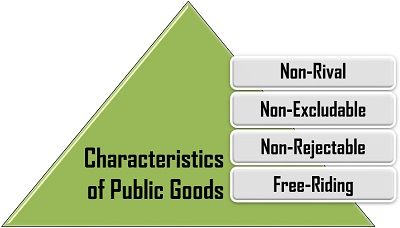
- Non-Rival: The public goods are non-competitive, i.e. it can serve many people at the same time without hindering the usage of one another.
- Non-Excludable: These goods are usually free of cost and can be used by anyone without any restriction.
- Non-Rejectable: The consumption of such goods cannot be dismissed or unaccepted by the public since it is available collectively to all the people.
- Free-Riding: The goods categorized under public goods benefit even those who have not paid for it. Such people are termed as free-riders.
What are Private Goods?
Private goods are the products or services which are manufactured or produced by the companies owned by entrepreneurs who aim at meeting customer’s requirement to earn profits through the trading of such goods in the free market.
Characteristics of Private Goods
Private goods serve the personal needs of consumers. Following are the various characteristics of these goods: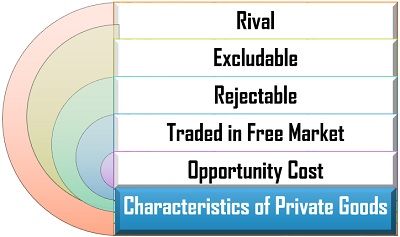
- Rival: The private products involve rivalry or competition among the consumers for its usage since the consumption by one person will restrict its use by another.
- Excludable: These goods involve cost, and therefore the non-payers are excluded from the consumption.
- Rejectable: Private goods can be unaccepted or rejected by the consumers since they have multiple alternatives and the right to select the product according to their preference.
- Traded in Free Market: Such goods can be freely bought and sold in the market at a given price.
- Opportunity Cost: These goods have an opportunity, i.e. the consumer has to let go of the benefit from a similar product while selecting a particular private commodity.
Advantages of Public Goods
Public goods carry the mass benefit for the people. They have a broader perspective.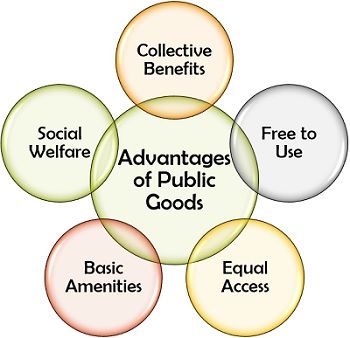
These goods can be used by many people or the public simultaneously. These are usually free of cost and can be utilized by the rich and poor equally.
The primary objective of such goods is to provide essential amenities to the public in general, along with promoting social welfare and development of the nation as a whole.
Advantages of Private Goods
These goods have a mutual benefit for the manufacturers and the consumers; both serve their purpose through the selling and buying of such products respectively.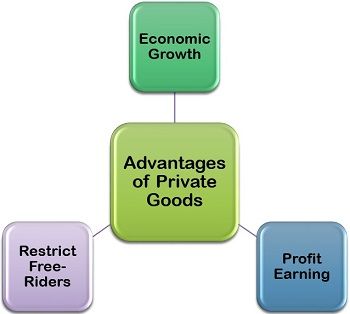
Private goods are essential to carry on trade activities for economic development. It is done with the motive of earning a profit from the entrepreneurs.
Such goods restrict the consumption by the people who do not have buying capacity, thus limiting its usage by the rich in other words it discourages the free-riders.
Disadvantages of Public Goods
Let us see some of the limitations of public goods, elaborated below: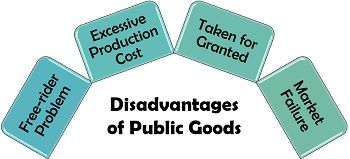
For providing public goods to be used by all the people, government charges tax from a few consumers while the others are free to use the services or commodities even without paying for it. They are called free-riders. Some also find a way for tax evasion. This increase the cost of production of such products for the government and leads to market failure.
Moreover, these facilities or benefits are taken for granted and misused or not maintained by some people since they have not paid for it and did not realise its value.
Disadvantages of Private Goods
Now, to find out the drawbacks of private goods, read below: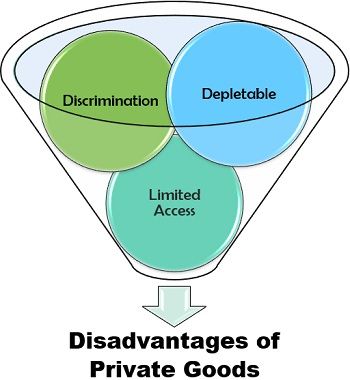
Private goods are manufactured by the private sectors, and therefore they function on demand and supply concept. These products or services goes on decreasing with each use since the goods bought by one consumer cannot be purchased by the other.
These goods create discrimination among the rich and the poor or the payers and the non-payers since they limit the access for those who don’t have purchasing power.
Summary
- Public goods are produced by the government or by nature for the welfare of the people without any cost. But private products are the ones manufactured and sold by private companies to earn a profit.
- When nature or the government provides public goods, private goods are produced by the businessmen or the entrepreneurs.
- In the case of public goods, rich or poor can equally benefit from such goods. Whereas, in fact of private products, only rich people who have the purchasing power can relish its benefits.
- The former is readily available and accessible by all the public. However, the latter diminishes with the consumption of each unit by the consumers.
- The quality of public goods remains constant for all consumers. But, the quality of private goods vary as per the purchasing power, i.e. more purchasing power means a better quality of the product.
- Public goods are a social choice, i.e. it aims at benefiting society as a whole. Whereas, private products is a consumer’s preference and decision-based on individual needs.
- The primary objective of the former is the growth and development of the country; however, the latter aims at profit earning by the entrepreneurs.
- Public goods cannot be traded in the free market, whereas private products are sold in the open market only.
- When public goods have no opportunity cost, private goods have an opportunity cost where the person choose one product over the other.
- Public goods are available to even those who did not pay any tax known as free-riders, whereas the same is not the case in private products.
- The former is non-rival, i.e. it is available and can be used equally by all the public at the same time. However, the latter is rival and cannot be used by the two or more people simultaneously.
- Public goods do not discriminate or restrict people by the buying capacity; these are freely assessable by all. On the contrary, private goods are excludable and prevent its consumption by the people who don’t have purchasing power.
- The demand curve for public goods is horizontal, whereas the demand curve for private products is vertical.
- The various examples of public goods are police service, fire brigade, national defence, public transport, roads, dams and river. On the contrary, clothes, cosmetics, footwear, cars, electronic products and food are examples of private goods.
Both the goods, public and private are essential for the development of a country.
Public goods are a necessity to provide the essential amenities to the people for improving the quality of life.
Private goods are equally essential to meet the consumer needs and requirements, enhance the trade activities in a country and promote economic development.
Masum Billah says
This writing is very helpful for students like us. Thank you so much for your nice work.
Asif shaban says
It was amazing. More power to your pen.❤️❤️❤️❤️❤️
Yati says
Wonderful writing, like it
fatou barrow says
thanks alot it really help me
Sadeeq Gital says
Thanks you
We student Appreciate your write up
Keep on
Nirmal Chaudhary says
Superb,
LIster sakala says
wow, your writing was very helpful. Thank you so much
Jacenta says
nice presentation
Han says
This helps me so much. Appreciate it.
Febby says
very educative
Sharnise Christy says
very insightful